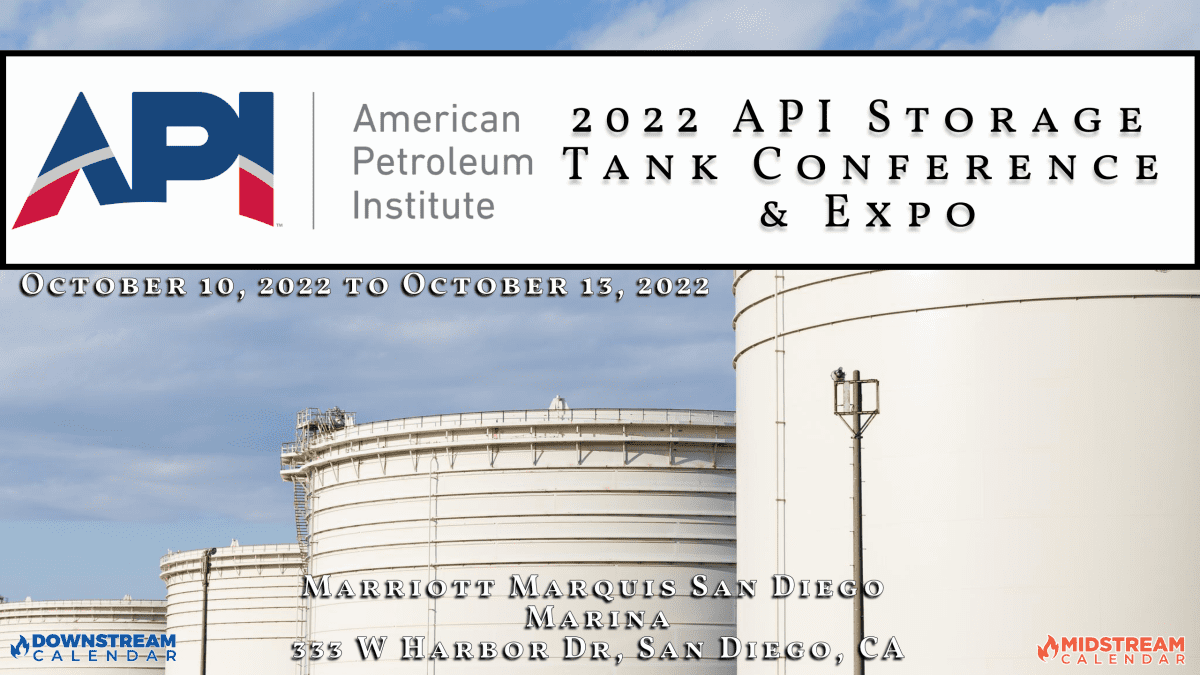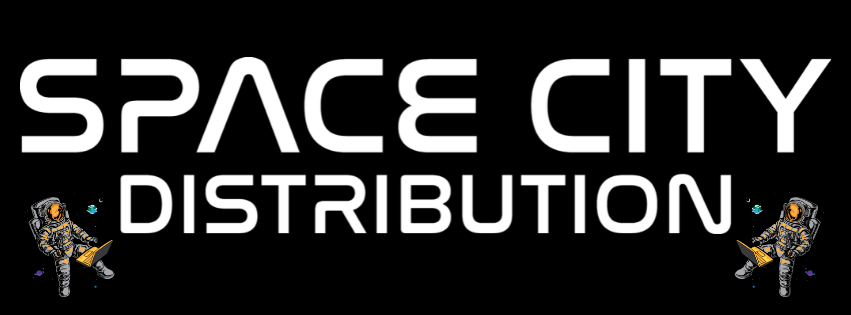
2022 API Storage Tank Conference & Expo Oct 10 – 13 – San Diego
This Event Reminder is Sponsored by:
2022 API Storage Tank Conference & Expo
October 12-13, 2022 | Marriott Marquis San Diego Marina | San Diego, California, USA | www.api.org/storagetank
*As of October 6, 2022 | Agenda subject to change
Wednesday, October 12, 2022
7:00 am – 8:00 am Registration, Continental Breakfast, & Exhibit Viewing
8:00 am – 8:15 am Welcome: Opening Remarks and Safety Moment
2022 Conference Co-Chairs:
Dave Cushman, West Virginia Paint, LLC
Earl Crochet, Crochet Midstream Consulting
8:15 am – 9:00 am Session K1: Keynote –You can’t buy that!
Perspectives on corporate culture and caring when bad things happen.
Speakers: Earl Crochet, Crochet Midstream Consulting
Dave Cushman, West Virginia Paint
9:00 am – 9:20 am Morning Refreshment Break & Exhibit Viewing
9:20 am – 10:30 am
SESSION 1A: ASCE 7-22 Impact on Aboveground Storage Tanks
Moderator: Mark Jordan, CB&I
The presentation will discuss the impact of the 2022 edition of ASCE 7 on the design of aboveground
storage tanks and their foundations designed to API standards. ASCE 7, Minimum Design Loads and
Associated Criteria for Buildings and Other Structures, is an integral part of building codes in the
United States. ASCE 7 describes the means for determining design loads including dead, live, soil,
flood, tsunami, snow, rain, atmospheric ice, seismic, and wind loads and their combinations for
general structural design. ASCE 7-22 will be adopted by the 2024 edition of the International Building
Code (IBC) and into most state and local building codes by 2025.The presentation will provide an
overview of many of the major changes made in the 2022 edition of ASCE 7-22. While changes in
each chapter are discussed, most of the presentation will concentrate on the major changes in the
seismic and wind chapters, including the new Chapter 32 – Tornado Loads. Some of the changes to
be discussed include mandatory use of electronic databases containing loading information; New
alternative method for determining loads from water in soil; New ground snow loads; 22 period multipoint response spectrum for seismic design; New seismic force equation for nonstructural
components, and Addition of tornado loads for Risk Category III and IV structures.
Speaker: Greg Soules, CB&I Storage Solutions LLC
SESSION 1B: Floating Roof Stabilization and Cribbing
Moderator: Mark Howard, US EPA
Save Time, Save Money, Save the Environment, Most Important Save Lives. Get your tank back in service
15-18 days faster. Prevention of floating roof collapse during cleaning, inspections, and repairs.
Speaker: David Bush, Delta P Technology International, LLC
10:30 am – 11:00 am Morning Refreshment Break & Exhibit Viewing
11:00 am – 12:00 pm SESSION 2A: You Got the Data, Now What?
Moderator: Dan Fleck, HUVR
Congratulations you have completed the effort to centralize your tank data into a single database. Now
comes the fun part in using that data to plan out your inspection program and move to a more
predictive maintenance program. Come follow this one engineer’s data centralization journey including
overcoming challenges and identifying pitfalls to move to an actionable database.
Speaker: Mark Kachelmyer, Plains All American
SESSION 2B: Coating in the Cold: Internal Lining under Adverse Weather Conditions
Moderator: Jerry Kolek, Consolidated Fabrication & Constructors
Your tank is out of service, it is 20 F degrees outside, it is snowing and you have to install an internal
lining. What can you do to have the most successful application under adverse conditions. This program
will explore the advances in coating technology along with practical considerations and shortcomings.
Speaker: David Cushman, West Virginia Paint
12:00 pm – 12:40 pm Lunch
12:40 pm – 1:10 pm Exhibit Viewing
1:10 pm – 1:55 pm SESSION 3A: Advances in Coatings for Storing Biofuels – Next Generation Novolac Epoxy
Coatings
Moderator: Matt VanAlsburg, Advance Tank and Construction
Sherwin Williams has tested several of its primary lining technologies and some linings are showing
no degradation beside slight discoloration, normal for novolac linings exposed to temperature.
Exposure has been to Beef Tallow and Waste Cooking oil for six months at 71°C (160°F) including the
addition of water. Biofuels are more aggressive than conventional petroleum products and require
advanced technology in linings for corrosion protection
Speaker: Selwyn Williams, Sherwin Williams
SESSION 3B: Continuing Professional Development Update for API 653
Moderator: Jose Godoy, API
Continuing Professional Development hours (CPDs) will be phased in for ICP recertifications starting
January 2023. These requirements will support certified individuals in enhancing and strengthening their
knowledge, skill set, and overall value to industry operations. As with other professional credentials, CPDs
are a significant part in ensuring that individuals are feeding the potential for continued skill enrichment.
This helps establish a continued lifelong learning journey that encourages professional growth and career
advancement. In this informational session we will review benefits to the inspector as well as a detailed
review of the requirements
Speaker: Andri Orphanides, API
1:55 pm – 2:15 pm
2:15: pm – 3:25 pm
Afternoon Refreshment Break & Exhibit Viewing
Session 4A: Mechanical Assessment of a Fuel Storage Tank Under 36 Hrs. of Fire
Moderator: Ron Santelik, Rowell Chemical Corporation
Western Region distribution Department is one of the Saudi Aramco downstream organizations that
operate 125 different tanks which store Diesel oil, Kerosene, and gasoline Products. During the fire of
one of the kerosene tanks, that have a capacity of 500 BBL, fire for 36 hours duration was started on
the nearest tank that have a large quantity of kerosene. After extinguishing the fire, full mechanical
assessment was performed to evaluate the tank shell and bottom plate, piping, and related equipment.
Also, how were handle the difficulties such as the water supply, foam system, and leaking problem. In
addition to the limitation of applying the FFS API for tanks after the fire is over.
Speaker: Abdulrahman Alghanmi, Saudi Aramco
SESSION 4B: Deploying Wireless Overfill Prevention Systems Per API-2350
Moderator: Mark Kachelmyer, Plains All American Pipeline, L.P
API 2350 overfill prevention philosophy & practice-The ongoing goal of all AST’s having overfill prevention
Industry acceptance of wireless technology Overview of an industrial wireless network based on IEC & ISA
standards “Independence” – As it pertains to API 2350 types of wireless devices & systems for overfill
prevention Overview of installation cost – wired vs wireless systems Proof-testing wireless overfill prevention
systems.
Speakers: Johan Sandberg, Emerson Automation Solutions
Rich Ireland, Emerson Automation Solutions
3:25 pm – 3:45 pm Afternoon Refreshment Break
3:45 pm – 5:00 pm SESSION 5A: Improving Differential Settlement Data and Analysis
Moderator: Kenneth Esplin, State of Washington Department of Ecology
This presentation will go into the theory of differential settlement and how it can be applied to laser
scan data. It will provide the requirements and criteria for legitimate analysis of laser scan data.
Moreover, it will provide the ultimate gold standard when all settlement screening methods fail.
Speaker: Phil Myers, PEMY Consulting
SESSION 5B: Biomechanics: A Material Selection Journey for Biofuel Storage
Moderator: Rafael Rengifo, Becht
As the Renewable Fuel Standard (RFS) and other initiatives continue to impact the type of fuels and
feedstocks used, there has been continuous learning of the impacts on corrosion and the related lining
material selection.
Speakers: Justin Manuel, Carboline
Doug Sinitiere, Carboline
SESSION 5C: Utilizing Robotic Inspection Data to Support AST RBI Analysis
Moderator: Amy Baxter, Enbridge
This presentation will discuss the novel use of in-service robotic inspections to acquire supporting POF
and COF data without taking tanks out-of-service to perform an internal inspection. Additionally, this
presentation will identify the specific data fields robotics may be able to acquire and the impact this
additional data may have on the RBI analysis of the tank.
Speakers: Steven Bolinger, Becht Engineering
Matt Crist, Square Robot
5:00 pm – 5:05 pm Wrap Up of Day One
2022 Conference Co-Chairs:
Dave Cushman, WV Paint
Earl Crochet, Crochet Midstream Consulting
5:05pm – 6:00 pm Reception, Exhibit Viewing, & Networking – Platinum Sponsors:
Bechtel, DJA Inspection Fisher Tank Company, Paso Robles Tank,
Roundtable Engineering Solutions, TANCO Engineering
Thursday, October 13, 2022
7:30 am – 8:00 am Registration, Continental Breakfast, & Exhibit Viewing
8:00 am – 8:15 am Opening Remarks and Safety Moment
8:15 am – 9:00 am Session K2: Keynote – Common SPCC Rule Misconceptions at Petrochemical Facilities
Come see the Top Ten SPCC regulatory misconceptions presented by the USEPA National Program
Manager and SME.
Speaker: Mark Howard, US EPA
Moderator: Larry Foster, Marathon Petroleum Company
9:00 am – 9:20 am Morning Refreshment Break & Exhibit Viewing
9:20 am – 10:30 am SESSION 1A: Fiber Optic Technologies for Storage Tanks
Moderator: Peter Williams, Concord Tank
The wave of technology has been pushing its way to midstream and downstream assets, including
storage tanks. Understanding some of these technologies can be confusing. However, applying these
technologies to optimize your operations can have a huge return on investment. The presentation will
cover overview of some newer technologies in storage tanks and tank inspection, overview of fiberoptics, history and benefits of fiber-optics, in service and out-of-service applications and positive
impact to ESG and regulatory compliance programs.
Speaker: Robert Smith, Axon4D
SESSION 1B: Don’t Let Poor Soils Limit Your Tank’s Potential: Two Decades of Storage
Tanks Supported on Ground Improvement
Moderator: Todd McClellan, Colonial Pipeline
Storage tanks are typically built over weaker soil profiles that may limit the tank capacity or require
costly deep foundations. Ground improvement provides an economical foundation alternative that
mitigates unsuitable soil conditions and achieves the performance requirements with lower costs and
quicker schedules, and in many cases allowing for more storage capacity. In this presentation we will
review case histories of ground improvement supported storage tanks, illustrating the option(s)
selected and the geotechnical challenges mitigated.
Speaker: Brian Frelich, Keller North America
10:30 am – 10:50 am Morning Refreshment Break & Exhibit Viewing
10:50 am – 12:00 pm SESSION 2A: Bottom Leakage Due to SCC
Moderator: Kathy Hawks, Colonial Pipeline
An unexpected bottom leakage in a sugarcane anhydrous ethanol tank with no general corrosion
leaded Brazilian engineers to find out the occurrence of SCC. The solutions approached involved
coating tractive stress regions and central column bottom attachment redesign.
Speaker: Mauricio Jardim, Petrobras
SESSION 2B: A Novel Approach to Hydrocarbon Removal from Tank Wash Wastewater
Moderator: Phil Myers, PEMY Consulting
A case study showcasing one of the largest tank terminal companies validated new wastewater
treatment system, maintaining permit compliance, reducing treatment times, secondary sludge, and
greenhouse gas emissions. This is helping the company reduce operational costs, ensure compliance,
and achieve decarbonization goals.
Speaker: Sophia Babbanova, Aquacycl
12:00 pm – 12:40 pm Lunch
12:40 pm – 1:10 pm Exhibit Viewing
1:10 pm – 1:55 pm SESSION 3A: Low Pressure Tank Vents in Vapor Collection Service
Moderator: David Nadel, Chevron
Collaborative presentation between a Vent and Flame Arrestor Manufacturer and a Low-Pressure
Tank Overpressure System Design Engineer on how to address the hydraulics of a low-pressure tank
vent in a collection system in conjunction with ignition control.
Speakers: John Burgess, Smith & Burgess
1:55 pm – 2:15 pm Afternoon Refreshment Break & Exhibit Viewing
2:15 pm – 3:25 pm SESSION 4A: Lightning Strike, Explosion, Tank Fire, and Lessons Learned
Moderator: George Morovich, Tank and Environmental Technologies, Inc.
This is a case study of a tank lightning strike event that ignited a small explosion at the external
floating roof seal. We will review the fire response, damage assessment, and repairs. Important
lessons learned include maintenance issues, response preparedness, seal and floating roof design,
engineering tools, and repair methods. There were competing theories on the root cause, and we will
investigate the leading root causes of the fire and best practices for prevention.
Speaker: Andrew Yearwood, PEMY Consulting
SESSION 4B: Ammonia Storage Configurations
Moderator: Joe Mentzer, Steel Tank Institute
A recent big push toward green energy transition has increased demand for large capacity ammonia
storage tanks as ammonia can be used as means to transport hydrogen molecules. Specific liquefied
ammonia storage system selection, including storage tank configuration and insulation type, are
dependent on risk assessment, regulatory requirements, ambient conditions, and the project budget.
This presentation examines pros and cons of various ammonia storage configurations, to help the tank
system owner make an educated selection of the refrigerated ammonia storage system most suitable
for purpose.
Speaker: Alex Cooperman, CB&I Storage
3:25 pm – 3:45 pm Afternoon Refreshment Break & Exhibit Viewing
3:45 pm – 4:55 pm SESSION 5A: Assessments of Dents and Shell Deformation in API 650 Tanks for Fertilizers
and Chemical Storage
Moderator: Earl, Crochet
Recent substantial increase in cost to build new tanks and repair existing tanks necessitates novel
approaches to assess both suitability for service and remaining life of a tank after denting or
deformation. Advanced analysis and fitness-for-service assessment procedures can help avoid costly
repairs and downtime when tank shells are dented or deformed.
Speaker: Siji Abraham, Quest Integrity
SESSION 5B: FEA Based Level 3 Assessment of Deformed Tanks
Moderator: Andrew Yearwood, PEMY Consulting
This paper describes a methodology used to evaluate the FFS approach of the deformed tanks under
gravity, internal hydrostatic pressure, wind, snow, seismic and external pressure using modern
measurement techniques, FEA, and CAD tools. This paper shows the complete workflow of importing
a laser scan data of a deformed storage tank into CAD, creating a realistic surface from the scan data,
and importing that realistic surface into FEA software to perform detailed Level 3 FFS of the tank.
Speaker: Arindam Chakraborty, VIAS3D
4:55 pm – 5:00 pm Closing Remarks
2022 Conference Co-Chairs:
Dave Cushman, West Virginia Paint LLC
Earl Crochet, Crochet Midstream Consulting
5:00 pm – 6:00 pm Closing Reception and Networking
About Our Media Partner:

Providing Quality Ensured Products

PIPE, FLANGES, FITTINGS, BOLTS, GASKETS, OLETS & MORE…
SCD is the premier PVFF distributor of special alloys supplying carbon steel, stainless steel and special alloy materials such as chrome, stainless and nickel. Providing industry leading manufacturers to meet your Approved Manufacturers List (AML) combined with complete documentation packages and product support, we help get your projects off the launch pad on time and within budget.
VALVES, INSTRUMENTATION, PUMPS, MOTORS & ALL YOUR MRO NEEDS
From MRO, Electrical and Instrumentation to Tooling, Fasteners, Auto, Plumbing supplies and more, Space City Distribution has access to industrial basics and equipment spares required for any build or maintenance project. We also provide top safety and uniform brands to have your team looking good and doing it safely, every time.

Follow www.DownstreamCalendar.com for upcoming industry events. Downstream Calendar was created to help synchronize the industry by providing a free lookahead for key industry events across the country. We focus on non-profit support, community, and industry specific trade shows and downstream conferences for refining plants, chemical plants, fertilizer plants, terminals, storage facilities, LNG plants, syngas, and bio mass. Follow MidstreamCalendar.com for Midstream Events. We are the original energy calendar that bring together All Streams of Energy. Follow us for upcoming oil and gas events.
2023 Oil and Gas Events added every day.
2022 Oil and Gas Events




Recent Comments